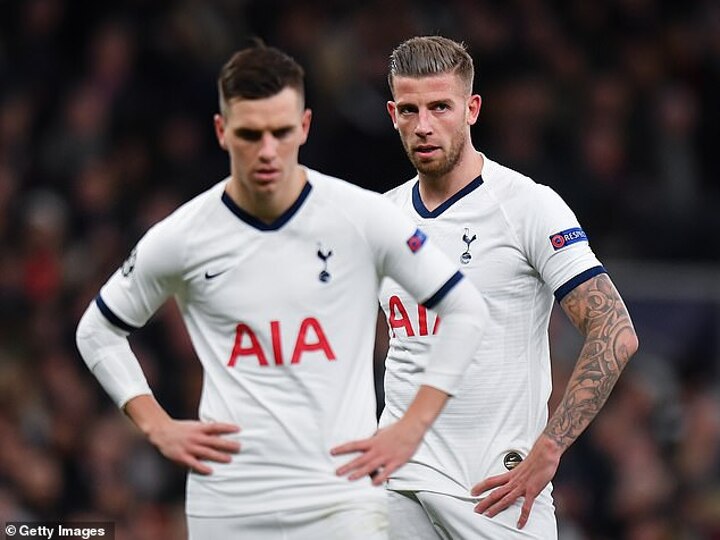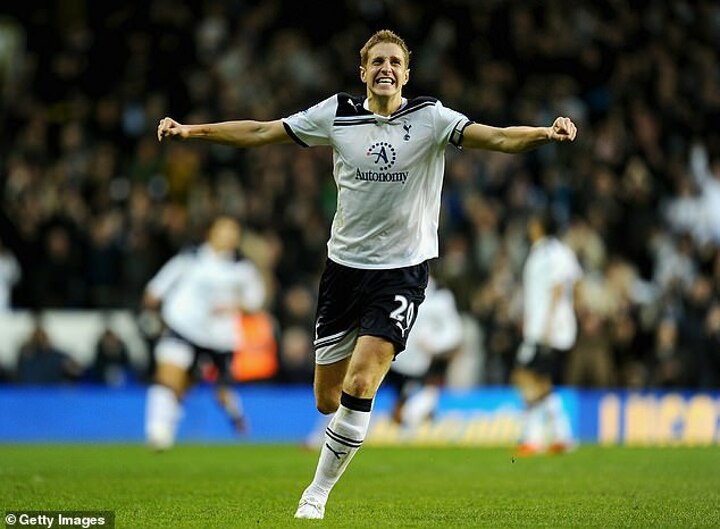If you turn up for matchday at the Tottenham Hotspur Stadium, you'll rarely catch a glimpse of the billionaire holding the keys to the kingdom.

Steeped in mystery, elusive Spurs owner Joe Lewis spends most of his time as a tax exile in the Bahamas and has little involvement in the club - with chairman and long-time friend Daniel Levy handling most of the day-to-day responsibility in north London under his orders.
The club has been making headlines in recent weeks - and for all the wrong reasons. With football on the backburner due to the coronavirus outbreak, clubs around the country are at sixes and sevens trying to secure their finances during the suspension.
But while some clubs have furloughed their non-playing staff to keep themselves above water, Tottenham - the eighth-richest club in the world - raised eyebrows with their decision to place 40 per cent of their workers on the government's Job Retention Scheme, as well as reducing wages of other employees by 20 per cent.
The club faced a huge backlash for their decision - with their own supporters' trust saying they had created a 'PR disaster' and urging them to reconsider. Eventually they were forced to make the U-turn after dismay was expressed by players, but not before they faced stinging criticism by a host of big names in football - including the man they used to employ as manager.
'I can't believe it,' Harry Redknapp told the Sun. 'Tottenham are owned by Joe Lewis, one of the richest men in the world, and his club are cutting the wages of all their non-football staff by 20 per cent. I can't believe it.'


With the club's finances taking centre stage as it juggles the coronavirus crisis with its stadium repayments and other debt, the spotlight now falls to Lewis - the man watching from the wings.
Nicknamed 'The Boxer', due to his namesake and former world heavyweight champion Joe Louis, 83-year-old Lewis is worth an estimated £4.4billion according to Forbes, making him the 30th richest person in the UK and the 375th richest in the world.
Having left school at the age of 15, Lewis started working on his dad's catering business Tavistock Banqueting and later took charge - transforming it into a restaurant franchise that he later sold for £30million.
He soon founded investment organisation the Tavistock Group in 1975, focusing on currency trading and later became a tax exile and based himself in the Bahamas in the 1980s and 1990s.
Lewis, 83, is said to have made his huge fortune by betting on 'Black Wednesday', when Britain was forced to withdraw from the European Exchange Rate Mechanism (ERM) after a collapse in the pound on September 16 1992.
The ERM was introduced in the late 1970s to stabilise European currencies in preparation for the introduction of the Euro. Lewis teamed up with hedge-fund manager George Soros in betting on the pound crashing out, and made eye-watering sums of money out of a national crisis.


His investment firm Tavistock delved into a number of different industries - hotels, restaurants, oil and gas companies, but it wasn't until the start of the millennium that Lewis turned his focus to football.
With Lewis now possessing more financial muscle after Black Wednesday, he began to set his sights on the sports and leisure world. In the early 1990s businessman Daniel Levy, his long-term family friend, had come to him offering to make those ambitions a reality. Together they started an offshoot of Tavistock called the English National Investment Company (ENIC).
It floated on the London Stock Exchange in 1997 and the firm began investing in a number of football clubs - Slavia Prague, Italian side Vicenza, Rangers, AEK Athens and then later taking Tottenham from Sir Alan Sugar in 2001 - with Lewis taking a controlling stake for £22m. Life-long Spurs fan and former season-ticket holder Levy, CEO of ENIC, was placed in charge as chairman.



ENIC started with a 29.9 per cent take before selling their stakes in other clubs to eventually buy out other shareholders at Spurs and increase their stake to 85 per cent by 2007.
Nearly 20 years later under the stewardship of ENIC, Spurs have gone from a struggling mid-table side to Champions League regulars with a state-of-the-art training ground, a £1billion stadium and a squad worth more than £700m.
But despite Tottenham's rise to prominence, there has always been an underlying feeling of resentment from Spurs fans aimed at ENIC and their perceived lack of investment in the playing squad. But with Levy as the face of the club and Lewis hiding on the other side of the world, it is the chairman who bares the brunt of the criticism.
Frustrations from supporters came to a head last season when Spurs failed to spend a single penny during the entire campaign, with previous cries of #ENICOUT resurfacing on social media as former manager Mauricio Pochettino was left without even one new signing to bolster his squad.
But Italian journalist Gabriele Marcotti told Spurs fans to instead vent their anger at Lewis, saying Levy was simply 'an employee of the club'.
He told The Times' podcast The Game: 'I don't know if people know that Daniel Levy doesn't actually own Tottenham. He operates Tottenham on behalf of someone else.
'There's a man called Joe Lewis. He owns Tottenham. He's a billionaire. He's a tax exile. What did he do? He busted the pound and the ERM in the early 1990s. And now he lives as a tax exile so he doesn't have to give money back to the country that enabled him to go and make all his money.
'Daniel Levy is an employee of the club. People should move beyond Levy, and look at the guy who actually, ultimately owns the football club.'


Spotting Lewis in the stands at Spurs happens once in a blue moon - he has only been sighted on a handful of occasions in the nearly two decades he has owned the club. The most recent appearance was at the Wanda Metropolitano last summer when the club stood on the brink of their biggest moment in history before a 2-0 defeat to Liverpool in Madrid.
Before that he was seen at the Tottenham Hotspur Stadium's inaugural game against Crystal Palace last year, with the billionaire turning up sporadically at White Hart Lane before it was demolished in 2017.
As suggested by his lack of desire to take a more hands-on role at Spurs, Lewis - who is believed to be friends with golfer Tiger Woods and actor Sir Sean Connery - does have plenty of other business ventures to dip his toes into.
He teamed up with Woods to create the ultra-exclusive Albany golf and leisure resort Albany in the Bahamas, a rich-man's playground where star players including Jordan Spieth and Rickie Fowler have shown off playing the course while bare-chested and necking beer on Spring Break vacation.
His Lake Nona Country Club in Orlando is home to a host of celebrities and sportspeople, including Ian Poulter and Justin Rose, who live a life of luxury behind closed gates.


He is the majority shareholder at Mitchells & Butlers, which owns a flock of pubs and restaurants including All Bar One, Toby Carvery and the Harvester chain.
He's rarely sighted on British soil but did make a return in 2011 when he came back to seize control of the firm - getting permission to dock his 223ft superyacht Aviva in the Thames near Tower Bridge - and even had his own moor built.
Aviva is thought to act at Lewis' mobile office and holds his personal art collection, with the billionaire reportedly living on board for months at a time. Lewis' actions since becoming owner of Spurs don't exactly paint the most welcoming of pictures, but he raised eyebrows in 2013 when he invited the entire Spurs team to join him on the yacht during a post-season tour of the Bahamas.
Then Tottenham skipper Michael Dawson had nothing but good things to say about Lewis after finally meeting him, calling him 'a really nice, normal guy', claiming he 'loves' watching Spurs play and knows everything about the club.


'I had never met him before, so it was nice to go over there and a great experience,' he said. 'What a really nice guy. And that yacht is unreal! But he's just a normal guy.
'You could chat to him about anything. He tunes into all the games, he loves it. We just sat there chatting. He made us feel so welcome over there. It was relaxed. A lot of team-bonding together.
'It helps to be able to put a face to the person investing so much in this club he wants to be successful. He's always watching. He knows what goes on. He would remember every game, every little thing.'
With Tottenham now in the midst of a crisis as they look to secure their finances and tackle the effects of the coronavirus head on, the club need help from Lewis more than ever. Last month it was reported that UEFA would relax its Financial Fair Play regulations to allow super-rich owners to inject more cash to keep themselves afloat.
Unlike Lewis, the likes of Chelsea's Roman Abramovich, Sheikh Mansour at Manchester City and even Mike Ashley at Newcastle, so often derided as the most soulless of all club owners, have ploughed hundreds of millions already into the running of their clubs.
Tottenham have vowed to make sure their non-playing staff are paid in full during the crisis, but they face huge challenges in the months ahead, with no matchday revenue and the prospect of issuing refunds to thousands of season-ticket holders.
Lewis has long had his critics, who accuse him of holding the tightest purse strings in the Premier League, never investing any of his own vast sums of cash and having a lack of passion for the club.
But in these extraordinary times, will Lewis finally put his hands in his own pockets and secure the future for the team he helped put on the map?
